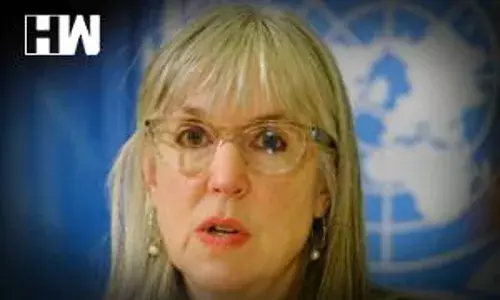For the last two years, the COVID-19 pandemic has focused global attention on the impact of vaccines in fighting the virus. During World Immunization Week, the World Health Organization (WHO) has been raising awareness of the crucial role immunization has played in reducing or eliminating a host of deadly diseases.
Dr. Kate O’Brien, Immunization Director at the World Health Organization, devoted her life to immunization after working in a paediatric ward in Haiti, where she saw that a third of the children admitted were dying from diseases that could be prevented through vaccines.
She explains how the United Nations, and its partners in the COVAX facility, are ensuring that vaccines reach every low-income country in the world.
“Between four and five million lives are saved each year, as a result of being vaccinated. Immunization is one of the most effective, most impactful health interventions in all of human history.
Hundreds of millions of people died from smallpox. It was a dreaded disease and in the late 1700s there was an amazing breakthrough. A British physician, Edward Jenner, noticed that milkmaids who had been infected with cowpox – a related disease – were more or less immune from smallpox.
He used that observation to immunize an eight-year-old boy, James Phipps, using the cowpox virus. Weeks later, he exposed James Phipps, with the permission of his parents, to smallpox, and he didn’t get sick.
Today smallpox has been eradicated worldwide, because of vaccination.
Another disease that’s targeted for eradication is polio.
Polio leads to limb paralysis and disability, and many people die from the disease.
In places like Pakistan and India, and many other countries, huge campaigns have vaccinated tens of millions of children over a short period of time.
We’re now at the point where polio has been reduced by over 99 per cent, and we’re so close to ending transmission of this virus.
Dying from a lack of vaccines
I worked in a hospital in Haiti, in the capital city, Port-au-Prince. The paediatric ward in that hospital was full of children with measles, diarrhoea, meningitis and tuberculosis. Some were born with tetanus. Every day, about a third of the children admitted to the ward died.
So many of the illnesses that they came in with, were completely preventable with vaccination.
I decided to devote my career to not only making sure that new vaccines were developed for diseases, but also, and more importantly, ensuring that the vaccines that we already have are completely accessible, completely available, completely safe, and effective for people in every part of the world, no matter what community they’re born in.
The power of COVAX
We’ve all been living through the COVID-19 pandemic over the last, enormously difficult, couple of years. We’ve seen the incredible development, in a remarkably short period of time, of vaccines that prevent COVID disease, and work against both infection and transmission.
One of the ways that vaccines have been sent into every country around the world is through the COVAX facility. This enables billions of does to be shipped to countries that need them but can’t buy them on their own.
Eighty per cent of the doses provided to low-income countries are coming through the COVAX facility, and around 92 nations are benefiting.
A social justice issue
We vaccinate against diseases that are transmissible from person-to-person. This means that, unless we protect ourselves through the use of vaccines, each of us presents some level of risk to someone else.
So, I really think of vaccination as a social equity and social justice issue.
There’s nothing more overwhelming, or more tragic, than a perfectly healthy child who succumbs to an infection that was completely preventable.”
As an independent media platform, we do not take advertisements from governments and corporate houses. It is you, our readers, who have supported us on our journey to do honest and unbiased journalism. Please contribute, so that we can continue to do the same in future.

